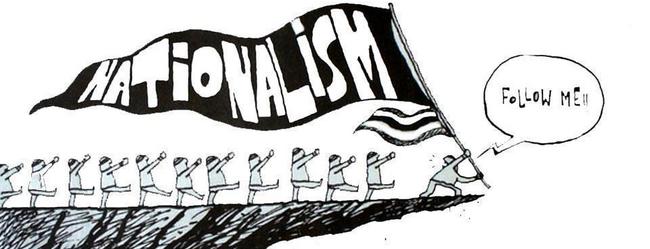Back to: GOVERNMENT SS2
Welcome to class!
In today’s class, we will be talking more about nationalism. Enjoy the class!
Nationalism II

FACTORS THAT LED TO THE RISE AND GROWTH OF NATIONALIST MOVEMENT
EXTERNAL FACTORS
- The Atlantic Charter: The publication at the end of the 2nd World war, declared the right of all people to choose the form of government under which they will live. The American government favoured decolonization and this encouraged nationalist to demand independence.
- Anti-colonial Posture of U.N.O: The organization adopted a negative posture towards colonialism and imperialism. It assisted nations fighting for independence and this revives the spirit of nationalism in the people of West Africa.
- British Labour Party: The labour party in Britain opposed the conservative party on their policy on colonialism. This influenced nationalism in Nigeria.
- The Independence of Some Countries: India in 1947 and Ghana in 1957 got their independence and this increased the agitation of Nigerian nationalists.
- Activities of Pan- African leaders/ Organizations: The impact of prominent individuals and black American leaders and other blacks in Diaspora like W.E.B. Du Bois George Padmore and organization like West Africa union students union, Negro world movement all preached against racial discrimination and liberation of black nations from all forms of colonialism. This massage inspired the spirit of nationalism.
- Loss of British Prestige: European power defeated Britain and its psychological effect influenced colonialism. Britain’s prestige worldwide was reduced.
- World War II: It exposed the myth surrounding white supremacy. The whites were in no way superior to the blacks.
- The Super Powers: The emergence of U.S.A and U.S.S.R as superpowers after the Second World War gave courage to nationalist activities in Nigeria and West Africa.
- The Colonial Posture of the United Nations Organization.
INTERNAL FACTORS
- Racial discrimination: The way the Europeans treated Nigerians in the civil service added more flames to the growth of nationalism in West Africa after 1945.
- The Introduction of the Elective Principle in 1922: This principle favoured only Lagos and Calabar. Many Nigerians were disenfranchised as such it provoked the growth of nationalism in Nigeria.
- The Return of Ex-service Men: The West African soldiers who participated in the Second World War came back with fresh ideas which they wish to put in practice to make their countries free like European nations.
- Activities of Educated Elites: Nnamdi Azikiwe, H. O. Davies, Herbert Macaulay, Obafemi Awolowo, Kwame Nkrumah, Jomo Kenyatta, etc. mobilized the masses for support during the struggle for independence.
- Establishment of political parties, newspapers, e.g. the West Africa pilot, Lagos daily news etc. played a vital role in the decolonization process.
- Trade Unions: Like the railway workers union led by Michael Imodu became militant. They used strike actions to back their demand for better conditions of service. They equally supported nationalist leaders in the struggle against colonial rule.
- Poor Prices: The poor prices at which the colonial rulers bought African produce contributed to the growth of nationalism in West Africa.
- Christianity and Establishment of Schools: This made the nationalist to realize that after all men are created equal by God.
FACTORS RESPONSIBLE FOR SLOW NATIONALIST ACTIVITIES IN FRENCH WEST AFRICA COLONIES
- Policy of Assimilation: The African elites enjoyed equal rights as there was no form of discrimination. They could not agitate or revolt since the system benefits them.
- Indignant Policy: This policy threatened the liberty of Africans. They arrested and imprisoned without trial.
- Absence of Political Parties: This made it difficult for people to express their political views on governing activities.
- Granting of Citizenship: France unlike Britain granted Africans from all its colonies French citizens. They enjoyed all the privilege and social amenities enjoyed to their white counterparts. Therefore it was unnecessary to form nationalist movements.
- Freedom of the Press: the government censored the press. There was no way of criticizing government policies.
EFFECTS OF NATIONALISM ON NIGERIA
- The nationalist movement led to the formation of political parties and political education e.g. NNDP, NCNC, AG.
- It led to the introduction of newspaper e.g. West Africans pilot, Lagos daily news etc.
- It led to the independence of Nigeria on 1st October 1960.
- It made Nigeria to become aware of their political and fundamental rights.
- The nationalist movement led to constitutional development and change in Nigeria.
- It projected the image of Nigeria and West Africans to the outside world.
- It forced the colonial ruler to modify their racial discrimination in the civil service.
GENERAL EVALUATION
- Explain how the Atlantic Charter contributed to the rise and growth of nationalism.
- What was the impact of the ex-servicemen to nationalist movement?
- Discuss 4 effects of nationalism in Nigeria.
- How did the policy of Assimilation contribute to slow nationalist movement in French West Africa colonies? (a) Define Electoral Commission. (b) State 6 features of an electoral commission.
In our next class, we will be talking about Constitutional Development in Nigeria. We hope you enjoyed the class.
Should you have any further question, feel free to ask in the comment section below and trust us to respond as soon as possible.
